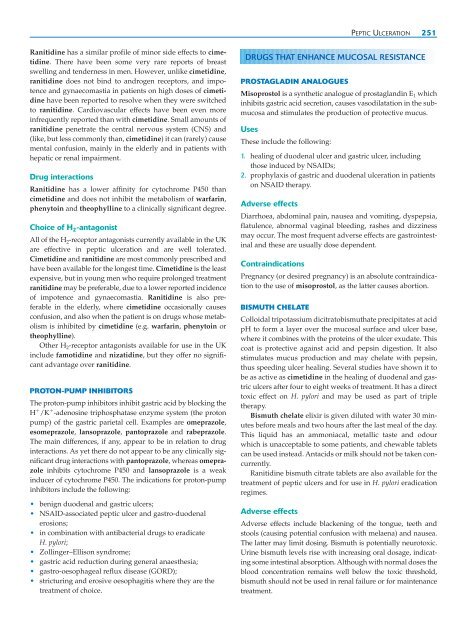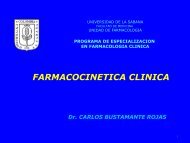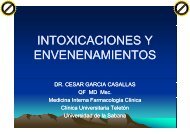Clinical Pharmacology and Therapeutics
A Textbook of Clinical Pharmacology and ... - clinicalevidence
A Textbook of Clinical Pharmacology and ... - clinicalevidence
- No tags were found...
Create successful ePaper yourself
Turn your PDF publications into a flip-book with our unique Google optimized e-Paper software.
PEPTIC ULCERATION 251<br />
Ranitidine has a similar profile of minor side effects to cimetidine.<br />
There have been some very rare reports of breast<br />
swelling <strong>and</strong> tenderness in men. However, unlike cimetidine,<br />
ranitidine does not bind to <strong>and</strong>rogen receptors, <strong>and</strong> impotence<br />
<strong>and</strong> gynaecomastia in patients on high doses of cimetidine<br />
have been reported to resolve when they were switched<br />
to ranitidine. Cardiovascular effects have been even more<br />
infrequently reported than with cimetidine. Small amounts of<br />
ranitidine penetrate the central nervous system (CNS) <strong>and</strong><br />
(like, but less commonly than, cimetidine) it can (rarely) cause<br />
mental confusion, mainly in the elderly <strong>and</strong> in patients with<br />
hepatic or renal impairment.<br />
Drug interactions<br />
Ranitidine has a lower affinity for cytochrome P450 than<br />
cimetidine <strong>and</strong> does not inhibit the metabolism of warfarin,<br />
phenytoin <strong>and</strong> theophylline to a clinically significant degree.<br />
Choice of H 2 -antagonist<br />
All of the H 2 -receptor antagonists currently available in the UK<br />
are effective in peptic ulceration <strong>and</strong> are well tolerated.<br />
Cimetidine <strong>and</strong> ranitidine are most commonly prescribed <strong>and</strong><br />
have been available for the longest time. Cimetidine is the least<br />
expensive, but in young men who require prolonged treatment<br />
ranitidine may be preferable, due to a lower reported incidence<br />
of impotence <strong>and</strong> gynaecomastia. Ranitidine is also preferable<br />
in the elderly, where cimetidine occasionally causes<br />
confusion, <strong>and</strong> also when the patient is on drugs whose metabolism<br />
is inhibited by cimetidine (e.g. warfarin, phenytoin or<br />
theophylline).<br />
Other H 2 -receptor antagonists available for use in the UK<br />
include famotidine <strong>and</strong> nizatidine, but they offer no significant<br />
advantage over ranitidine.<br />
PROTON-PUMP INHIBITORS<br />
The proton-pump inhibitors inhibit gastric acid by blocking the<br />
H /K -adenosine triphosphatase enzyme system (the proton<br />
pump) of the gastric parietal cell. Examples are omeprazole,<br />
esomeprazole, lansoprazole, pantoprazole <strong>and</strong> rabeprazole.<br />
The main differences, if any, appear to be in relation to drug<br />
interactions. As yet there do not appear to be any clinically significant<br />
drug interactions with pantoprazole, whereas omeprazole<br />
inhibits cytochrome P450 <strong>and</strong> lansoprazole is a weak<br />
inducer of cytochrome P450. The indications for proton-pump<br />
inhibitors include the following:<br />
• benign duodenal <strong>and</strong> gastric ulcers;<br />
• NSAID-associated peptic ulcer <strong>and</strong> gastro-duodenal<br />
erosions;<br />
• in combination with antibacterial drugs to eradicate<br />
H. pylori;<br />
• Zollinger–Ellison syndrome;<br />
• gastric acid reduction during general anaesthesia;<br />
• gastro-oesophageal reflux disease (GORD);<br />
• stricturing <strong>and</strong> erosive oesophagitis where they are the<br />
treatment of choice.<br />
DRUGS THAT ENHANCE MUCOSAL RESISTANCE<br />
PROSTAGLADIN ANALOGUES<br />
Misoprostol is a synthetic analogue of prostagl<strong>and</strong>in E 1 which<br />
inhibits gastric acid secretion, causes vasodilatation in the submucosa<br />
<strong>and</strong> stimulates the production of protective mucus.<br />
Uses<br />
These include the following:<br />
1. healing of duodenal ulcer <strong>and</strong> gastric ulcer, including<br />
those induced by NSAIDs;<br />
2. prophylaxis of gastric <strong>and</strong> duodenal ulceration in patients<br />
on NSAID therapy.<br />
Adverse effects<br />
Diarrhoea, abdominal pain, nausea <strong>and</strong> vomiting, dyspepsia,<br />
flatulence, abnormal vaginal bleeding, rashes <strong>and</strong> dizziness<br />
may occur. The most frequent adverse effects are gastrointestinal<br />
<strong>and</strong> these are usually dose dependent.<br />
Contraindications<br />
Pregnancy (or desired pregnancy) is an absolute contraindication<br />
to the use of misoprostol, as the latter causes abortion.<br />
BISMUTH CHELATE<br />
Colloidal tripotassium dicitratobismuthate precipitates at acid<br />
pH to form a layer over the mucosal surface <strong>and</strong> ulcer base,<br />
where it combines with the proteins of the ulcer exudate. This<br />
coat is protective against acid <strong>and</strong> pepsin digestion. It also<br />
stimulates mucus production <strong>and</strong> may chelate with pepsin,<br />
thus speeding ulcer healing. Several studies have shown it to<br />
be as active as cimetidine in the healing of duodenal <strong>and</strong> gastric<br />
ulcers after four to eight weeks of treatment. It has a direct<br />
toxic effect on H. pylori <strong>and</strong> may be used as part of triple<br />
therapy.<br />
Bismuth chelate elixir is given diluted with water 30 minutes<br />
before meals <strong>and</strong> two hours after the last meal of the day.<br />
This liquid has an ammoniacal, metallic taste <strong>and</strong> odour<br />
which is unacceptable to some patients, <strong>and</strong> chewable tablets<br />
can be used instead. Antacids or milk should not be taken concurrently.<br />
Ranitidine bismuth citrate tablets are also available for the<br />
treatment of peptic ulcers <strong>and</strong> for use in H. pylori eradication<br />
regimes.<br />
Adverse effects<br />
Adverse effects include blackening of the tongue, teeth <strong>and</strong><br />
stools (causing potential confusion with melaena) <strong>and</strong> nausea.<br />
The latter may limit dosing. Bismuth is potentially neurotoxic.<br />
Urine bismuth levels rise with increasing oral dosage, indicating<br />
some intestinal absorption. Although with normal doses the<br />
blood concentration remains well below the toxic threshold,<br />
bismuth should not be used in renal failure or for maintenance<br />
treatment.




